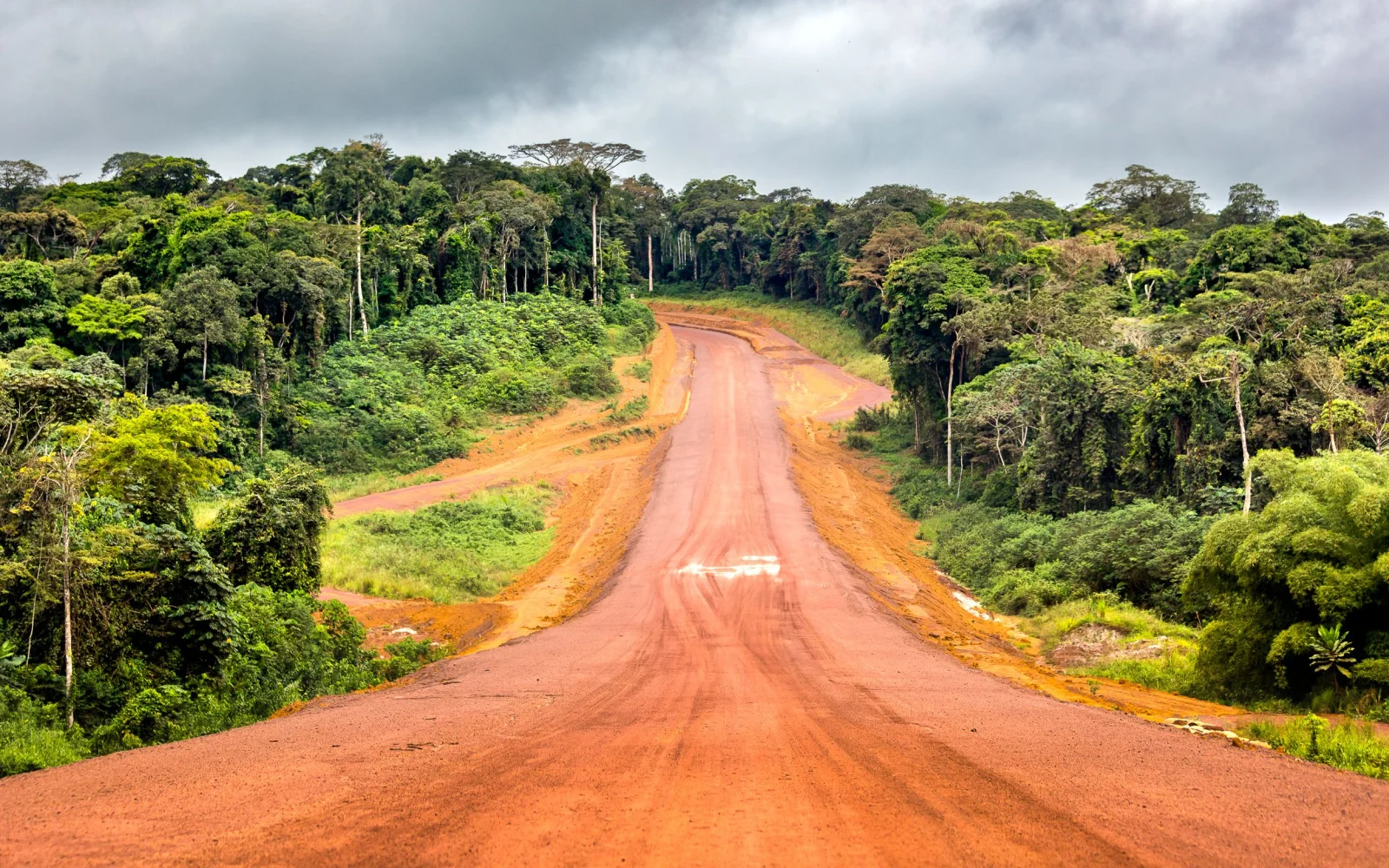Gabon is a country in Africa that often flies under the radar of tourists. However, it is one of the best places to visit for true nature lovers.
Gabon set aside 11.5% of its land for natural parks and 26% of its territorial waters for marine parks, meaning that there is a lot of beautiful nature to explore.
Some of the best parks are Lopé National Park, which preserves acres of rainforest, and Mayumba National Park on the coast, where you can spot whales and other animals.
Gabon is a great destination for adventure travelers thanks to its many natural parks and acres of nearly untouched wilderness. However, even the most adventurous travelers probably care for their personal safety.
Before visiting Gabon, check if the country is safe to visit first. But don’t worry — our travel experts have rounded up the most common safety concerns to help you figure out if it’s safe to visit. Let us be your guide!
Is Gabon Safe to Visit in 2025?
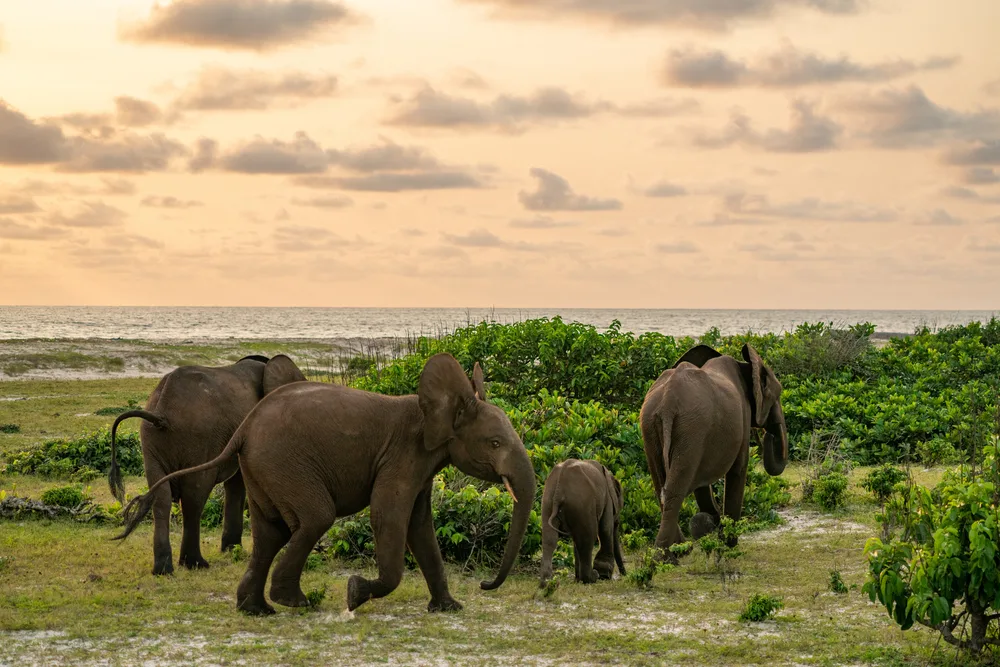
Dominyk Lever/Shutterstock
Gabon is mostly a safe country to visit. It is a stable democracy with little political violence and little to trouble tourists. However, bigger cities such as Libreville do have high rates of violent crime.
Foreign countries differ in the level of caution they advise their citizens to have when visiting Gabon. New Zealand doesn’t have a specific travel advisory in place for Gabon, and the United States just tells citizens to exercise normal precautions.
However, other countries advise their citizens to exercise more vigilance when visiting Gabon.
For example, Australia warns its citizens to exercise increased caution when visiting Gabon, putting the country under a yellow alert. The main reason it cites is the high rate of crime in cities such as Libreville and Port Gentil.
Common crimes include:
- Pickpocketing
- Bag snatching
- Vehicle break-ins
- Assault
- Armed robbery
- Rape
- Carjackings
Besides crime, many visitors to African countries worry about political instability. Gabon is a relatively stable democracy.
There was an attempted coup in 2019, but the government quickly brought the situation back under its control, and the only sign you might notice that there was a coup might be the elevated military presence in the streets.
Demonstrations do occur, especially around election season, but they rarely turn violent (you should still avoid getting caught up in one, just in case). Most visitors to Gabon are there with the goal of heading into nature.
If you are going exploring in the natural parks, make sure that you take the right precautions. Bring gear, especially waterproof clothing, as rainforests (obviously) get a lot of rain.
The infrastructure in Gabon is probably worse than you’re used to, so don’t expect that you can get medevacked out in case of an emergency — bring your own first aid kit, and don’t take on trails that are far above your skill level.
The overall infrastructure level in Gabon is much lower than in most other countries. If you want to visit, the best way to do so is through a licensed travel agency and with a guide (most foreign citizens need a letter of invitation to enter the country anyway).
There are not even well-maintained roads in most of the country outside of the main cities, so it is helpful to have someone else help you navigate those problems.
Crime in Gabon
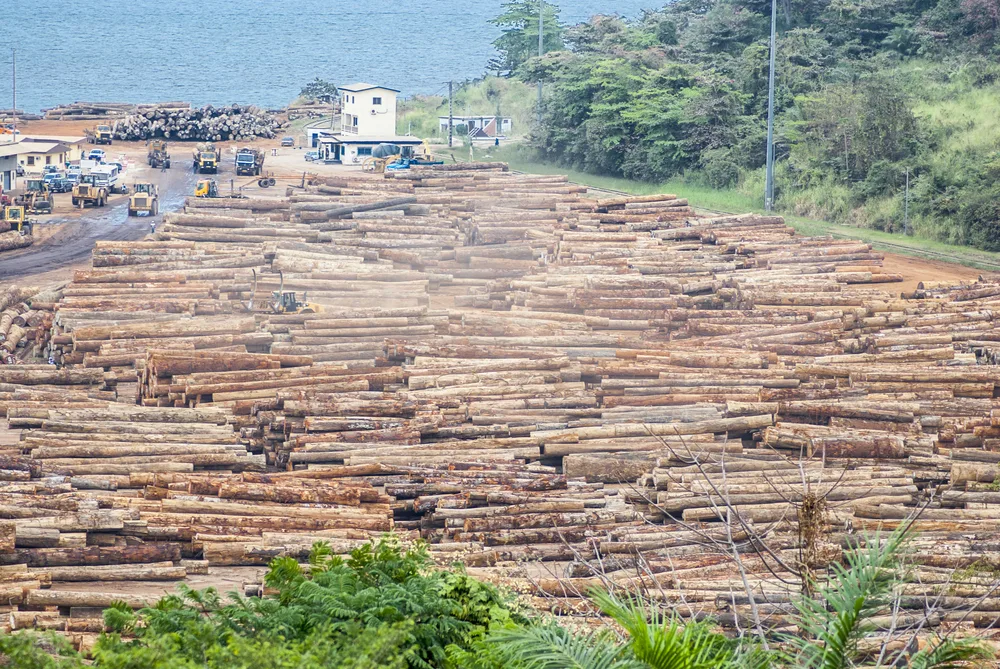
O.Rek’s/Shutterstock
The biggest concern in Gabon for most travelers is crime. This is, after all, the reason most foreign countries cite for their elevated travel advisories. However, pinpointing actual data on crime in Gabon is pretty hard.
The violent crime rate in Gabon is fairly high. According to some statistics, the homicide rate is 9 incidents per 100,000 people, which is higher than the global average. Homicides rarely affect foreigners, but other types of violent crime do.
The violent crime you are most likely to encounter is armed robbery, although it is hard to find exact statistics for how many robberies there are in Gabon targeting foreigners.
Anecdotally, there have been many incidents of armed robbery directed at ex-pats or tourists. Foreigners tend to be much wealthier than locals, which is why many criminals target Americans or Europeans for their crimes.
The rates of property crime generally are high in Gabon. According to Numbeo, the overall level of crime ranks 54.41 out of 100 on the site’s crime index, which is a moderate value.
Most people interviewed thought that crime has been increasing over the past three years, which is a troubling trend for Gabon’s overall safety. The crimes people feared the most were muggings, robberies, car break-ins, and theft.
By far, people are most concerned about corruption and bribery. There are a few reasons why Gabon has such a problem with crime. Corrupt officials often cooperate with organized criminal groups, especially when it comes to environmental crimes such as illegal logging.
Although these crimes don’t directly impact tourists, the overall atmosphere of corruption creates an atmosphere where criminals can operate with impunity. Gabon also has high levels of income inequality.
The country is a middle-income African country and gets plenty of wealth from its large oil reserves, but that wealth is highly concentrated in the hands of a few while a third of the country lives under the poverty line.
High levels of income inequality are often a driving force behind crime as desperate people get pushed into crime when they can’t make money the legal way and are often motivated by resentment when they see others living so much better than they do.
One interesting thing about the dynamic of crime in Gabon is that it is highly concentrated. The two biggest cities, Libreville and Port-Gentil, have most of the crime.
Rural areas are generally very quiet and don’t have a lot of crime. Since most visitors to Gabon are here for national parks, as long as you head out of the city fast, you probably won’t encounter a lot of crime.
Pickpocketing
As in many other places in the world, pickpocketing and other forms of petty theft are prevalent in Gabon. While there are no accurate statistics for pickpocketing in Gabon, anecdotal evidence cites that this is a common problem in the country.
Many countries, such as Australia, include petty theft in their warning for tourists. As with most other forms of crime that we mentioned, pickpockets primarily operate in big cities such as Libreville and Port-Gentil.
They target crowded places where they know people will be carrying cash, such as markets, popular tourist destinations such as Libreville’s promenade along the seafront, and transit hubs such as bus and train stations.
When you are in crowded places, make sure that your valuables are secure (of course, this is a personal safety trick that you should be practicing wherever you are in the world, not just in Gabon).
Keep your wallet, phone, and ID securely in a front pocket, money belt, or zippered bag that you hold firmly to your body. Thieves in Gabon often use distraction tactics to get to their victims.
One common tactic is for a member of a gang to step in traffic. Confused, drivers will stop, allowing others to smash car windows and grab what they wish. Be careful of anyone causing a scene and focus on getting out of the area as soon as possible.
The best practice is, of course, not to have a lot of valuables on your person that someone could steal. Try not to carry around lots of cash — leave some in your accommodations.
Make sure you choose your accommodation safely and that there is enough security that you feel safe leaving valuables in your room.
Leave precious family heirlooms, such as valuable rings, at home. Bag snatching is also common. Make sure that you keep a firm grasp on your bag at all times.
When sitting down at a restaurant or café, keep your bag on your lap instead of hanging on the back of your chair. When walking along a busy road, put your bag on the shoulder facing away from traffic to deter thieves that operate from the backs of motorcycles.
Tourist scams are actually not very common in Gabon, as the tourist economy is not developed enough for scamming to be lucrative.
The only exception is taxis. Before paying for anything, including a ride, negotiate the price and make sure that you agree on a cost before getting into a vehicle.
Armed Robbery
Petty theft is, unfortunately, the least of your problems in Gabon. Armed robbery is sadly common in Libreville and Port-Gentil. Robbers often target foreign ex-pats and tourists.
Most incidents of armed robbery occur after dark, so providers of travel advice generally recommend you stick to your accommodations at night. Be especially careful when driving at night, as carjacking is common after dark.
In particular, never visit isolated areas after dark. Gabon has beautiful beaches, but you should enjoy them during the day. At night, beaches, seaside promenades, and isolated side streets are often places where armed robbers lie in wait.
Even if you travel in groups, that is not a guarantee of safety, as robbers have been known to attack multiple people walking together. If you are robbed, hand over your valuables and focus on getting away safely to report the crime to your embassy.
Avoiding Bad Areas
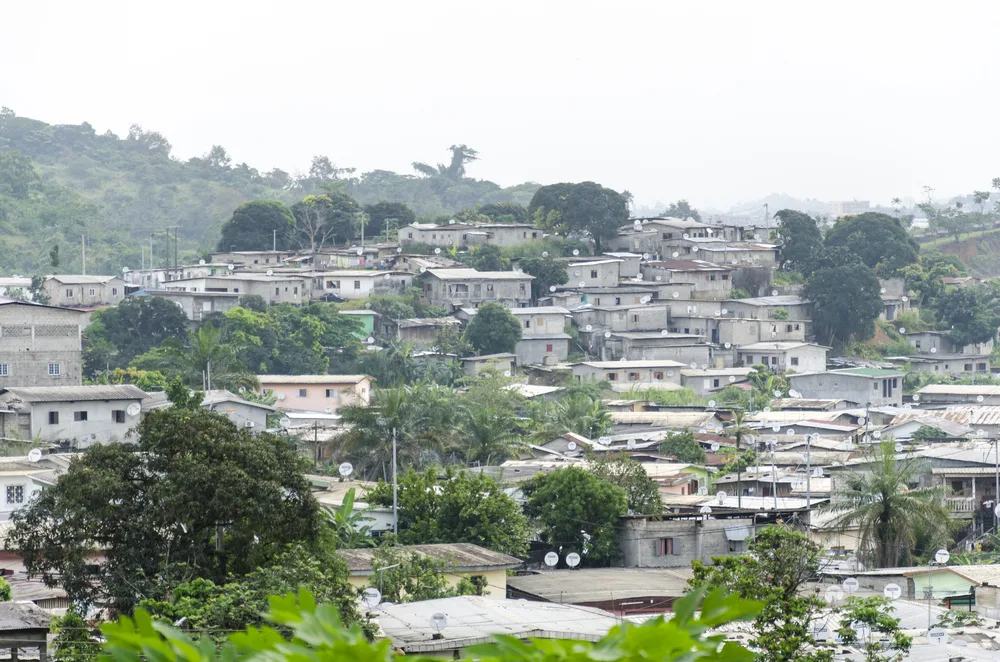
Cribe/Shutterstock
As mentioned above, the cities of Libreville and Port-Gentil see the most crime in all of Gabon. In Libreville, avoid neighborhoods such as Akébé, Kinguélé, and most neighborhoods that start with PK.
These neighborhoods are usually working-class or poor neighborhoods far from tourist attractions, so it’s unlikely you will wander into them by accident, but keep an eye out just in case.
Things to Consider
Here are some other safety tips for visiting Gabon:
- The tap water is not drinkable even after boiling, so only drink bottled water to avoid illness.
- Water and electrical outages are very common and a near-daily occurrence in some places. Be prepared with purchased water and power banks.
- Check which vaccines and medications you should have before visiting. Some countries recommend getting vaccinated against yellow fever, malaria, and hepatitis before visiting Gabon. Neighboring Equatorial Guinea is experiencing an outbreak of the Marburg virus, so the Gabonese government has put movement restrictions in some places near the border.
- Driving in Gabon is an extreme sport. Roads are poor in major cities and barely existent outside of the cities—most intercity roads are only navigable by 4×4. Drivers are careless, and extreme road rage is very common. It’s better to pay for a chauffeur or tour guide to drive you than to drive yourself.
Frequently Asked Questions
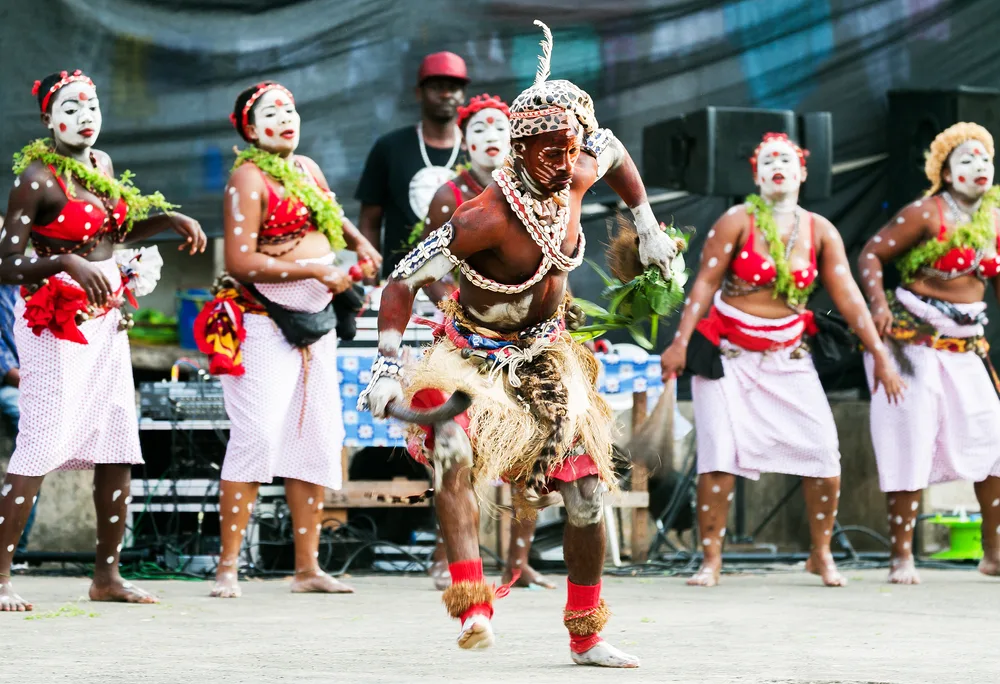
Libreville, Akanda Gabon – August 13 2021 : Traditional ceremony of Bwiti – Photo by YVAN PICTURES/Yoan Michel Mboussou/Shutterstock
Here are some common questions that you might still have before visiting Gabon:
What are the risks in Gabon?
Crime is a risk in Gabon’s two major cities. Besides that, be careful of natural disasters such as flooding as well as insect-borne and water-borne diseases.
Why is Gabon so expensive?
Visiting Gabon is a lot more expensive than visiting many other African countries, and there are a few reasons for that.
One is that the currency, the C.F.A., is pegged to the (no longer existing) French franc. Another is that resources for foreigners, such as adequate hotels, are very limited, driving up the prices.
Is Gabon a nice country?
Yes, Gabon is a nice country. It has some of the most beautiful nature in the world, and most of its rainforests have been protected from environmental destruction.
Does Gabon have tourism?
Gabon gets a few visitors a year, and part of the reason why the president designated so many national parks was to attract more tourists. However, the tourism industry is still very poorly developed, and very few visitors come annually.
What is Gabon most famous for?
Gabon is most famous for its rainforests, which cover most of the country’s interior and are very well preserved. The country gained most of its wealth from oil reserves, which the government then invested in preserving the rainforest.
So, Is It Safe to Travel to Gabon?
Visiting Gabon will require a lot of preparation. The bigger cities have high crime rates, requiring vigilance as you move out and about. In rural areas, crime is virtually nonexistent, but the infrastructure is poor.
Visiting Gabon is not the easiest thing in the world, but you will be rewarded with practically untouched nature. So what are you waiting for — book your trip to this idyllic country today!



